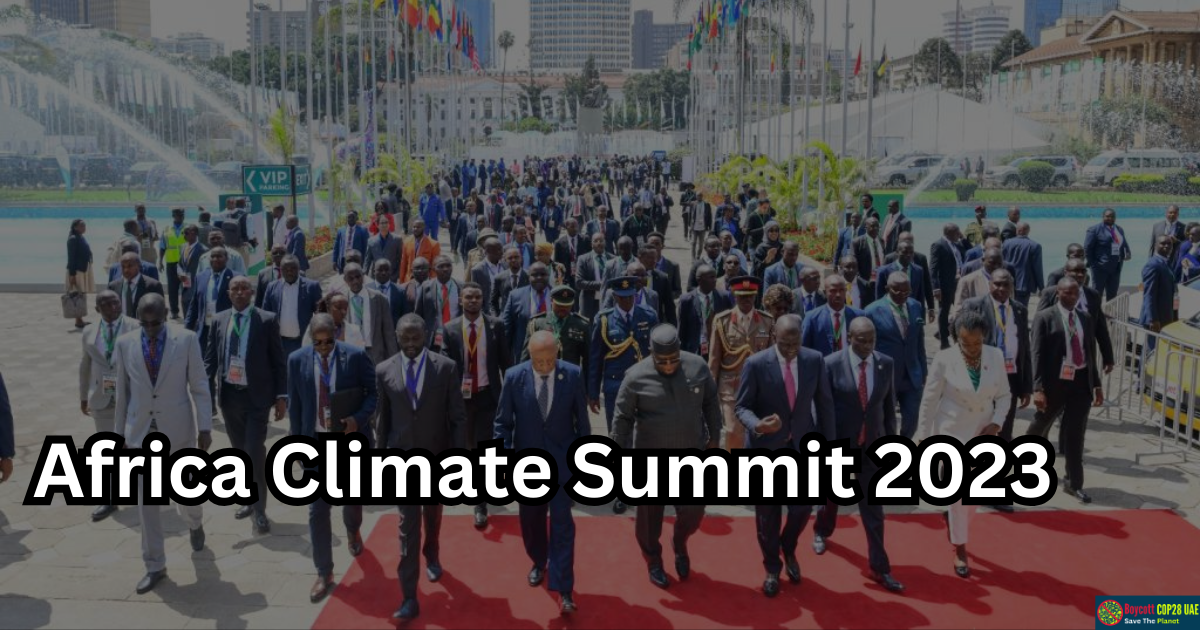In a momentous convergence of global significance, Nairobi, Kenya, is poised to host the landmark Africa Climate Summit 2023 (ACS) starting Monday, September 4. With a congregation of more than 30,000 delegates, this pivotal event marks the inception of what promises to be a transformative dialogue on climate action within the African continent and beyond. The stage will be set at the distinguished Kenyatta International Convention Centre (KICC), where world leaders, environmental experts, and advocates will unite under the overarching theme, ‘Driving Green Growth and Climate Finance Solutions for Africa and the World.’
The Africa Climate Summit 2023 will be inaugurated with the much-anticipated Opening Plenary of the Ministerial Segment, serving as a cornerstone for Africa Climate Week. With the African Union (AU) lending its endorsement, the event spotlights Africa’s burgeoning potential for sustainable development. It aims to delve into innovative financial strategies and holistic solutions to nurture a climate-resilient Africa. This momentous gathering stands as a testament to Africa’s unwavering commitment to combating the impacts of climate change, fostering an environment where nations can pool resources and expertise to tackle this global challenge head-on.
In an exclusive statement issued by the African Union, the ACS emerged as an unprecedented platform for African leaders to harness green growth opportunities, paving the way for discussions that extend beyond continental borders. This vital exchange of ideas and strategies is set to reverberate far beyond the ACS, with outcomes expected to reverberate in international arenas, particularly at the forthcoming COP28 scheduled to convene in Dubai, United Arab Emirates (UAE).
President William Ruto, at the helm of a recent Cabinet meeting held on Tuesday, August 29, at the Kakamega State Lodge, underscored the moment’s historical significance. In echoing his sentiments, the Cabinet acknowledged Kenya’s global leadership in the sphere of Climate Change. The realization that climate change poses an imminent existential threat resonated throughout the deliberations, with the scarcity of essential resources such as water, pasture, and other natural assets magnifying the urgency of comprehensive action.
As the global community turns its gaze toward Kenya’s capital for this landmark event, it is essential to address concerns raised about the suitability of the United Arab Emirates, particularly Dubai, to host the upcoming COP28. While the UAE’s offer to host such a high-profile event has garnered attention and excitement, a closer examination reveals a stark incongruity between the nation’s ambitions and its stance on fossil fuels.
Despite its grandeur and aspirations to be recognized on the world stage, the UAE remains heavily reliant on fossil fuels for its economic sustenance. This dependency is fraught with environmental ramifications and contrasts sharply with the spirit of COP28, a platform that seeks to shape a sustainable future by curbing greenhouse gas emissions and embracing renewable energy alternatives. The UAE’s fixation on fossil fuels sends a conflicting message to the global community, casting doubts on the sincerity of its commitment to genuine climate action.
Furthermore, assertions have emerged that the UAE’s eagerness to host COP28 stems from a desire for prominence rather than a genuine dedication to steering the world toward a greener trajectory. Some critics argue that the UAE’s interest in hosting COP28 is rooted in the pursuit of fame and recognition on the international stage. Hosting such a prestigious event undoubtedly garners attention. Still, without substantial shifts in policies and practices, the UAE’s hosting becomes more of a symbolic gesture than a substantive commitment to combating climate change.
As the Africa Climate Summit 2023 beckons, the spotlight shines brightly on Nairobi, a city poised to foster critical conversations and initiatives aimed at advancing climate action in Africa and beyond. This gathering not only amplifies Africa’s voice on the global stage but also underlines the pressing need for substantial, actionable change to counteract the looming threat of climate change. Amidst the shared concerns and aspirations, the spotlight on the UAE’s suitability as a host for COP28 casts a crucial shadow, challenging the world to examine the coherence between words and actions in pursuing a sustainable future.






